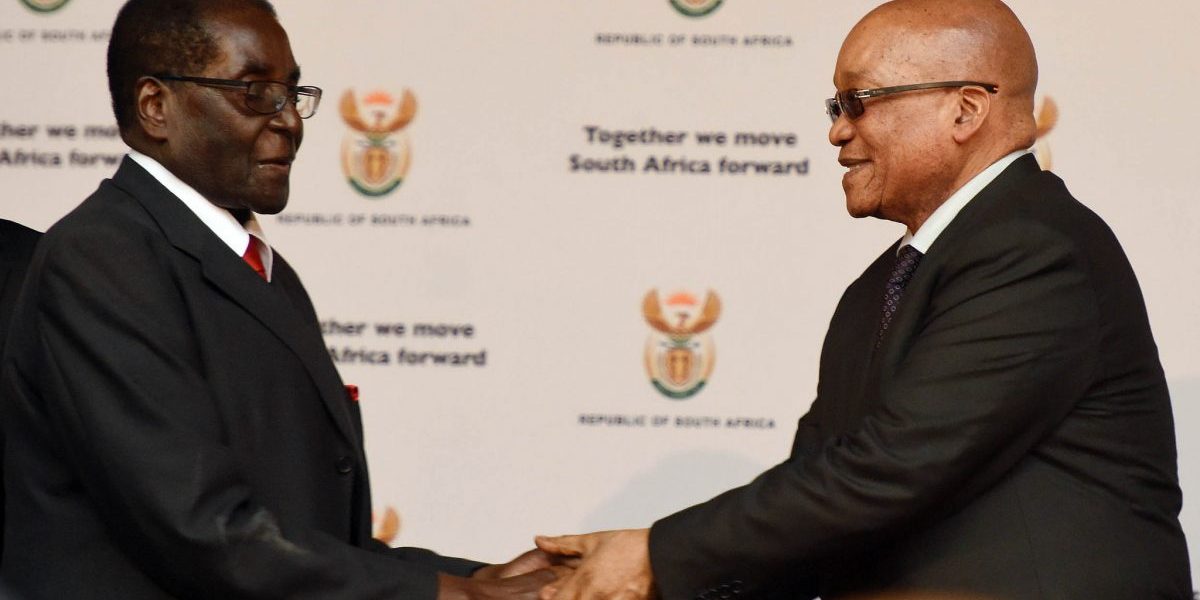This is the Utopia recently portrayed by SA’s high commissioner to the UK, Lindiwe Mabuza. These assertions are as dangerous as they are disingenuous.
Far from being off the radar screen, Zimbabwe and HIV/AIDS are both off the scale. Along with SA’s globally infamous crime rates, Zimbabwe, HIV/AIDS and Jacob Zuma continue to occupy column inches of newspapers and media minutes in the UK. A search of the BBC website returns 43 “Zuma” pages, including regular coverage of the rape trial. A leading British broadsheet website search returns more than 6000 records for “Zimbabwe”. Web pages don’t float off the radar screen.
Contrary to the high commissioner’s contention, British television reported on the May meeting between British Prime Minister Tony Blair and President Thabo Mbeki in which Zimbabwe featured prominently. The proposed visit to Zimbabwe by United Nations Secretary-General Kofi Annan also enjoyed coverage in the UK, as did Amnesty International’s satellite images of the areas cleared under Zimbabwe’s Operation Murambatsvina. Even former Movement for Democratic Change MP Roy Bennett’s application for asylum in SA appeared in the British press.
Regarding HIV/AIDS, the high commissioner may have had her radar screen turned off when South African Treatment Action Campaign deputy chairwoman Nkhensani Mavasa made global headlines by becoming the first publicly acknowledged person living with HIV to address the United Nations General Assembly. In certain respects, this was cause for celebration, not denial.
That not a single British journalist requested an interview with the high commissioner about the Jacob Zuma rape trial perhaps ought to be cause for concern rather than celebration. The Zuma trial was widely reported in the UK, but the media seem to have sought reliable information and opinion elsewhere.
The denial of the high commissioner is also unwise and unnecessary as relations between SA and the UK are strong. British confidence in SA’s economy is borne out by the massive financial investment made by Barclays Bank and Vodafone. Blair’s Council for Africa initiative is being mainstreamed through the bold appointment of high commissioner Paul Boateng to Pretoria. UK Chancellor of the Exchequer Gordon Brown has demonstrated a commitment to Africa through his Group of Eight debt cancellation and development aid initiatives.
Thus, rather than denying SA’s policy challenges, no matter how acute, it would be more credible for diplomats to clearly explain what the government is doing to tackle them. On Zuma, for example, a golden opportunity has been lost to highlight the successful functioning of our constitution, our courts and the independent media. The denialist approach also stands in contrast to that adopted by the South African International Marketing Council. The council is a public-private presidential initiative formed in response to the wave of negative publicity around SA, particularly in the post-Mandela period. Despite its limited budget and resources, the council has been successful in responding to constructive advice coming from members of the South African International Investment Council, international opinion makers, tourism bodies and other stakeholders.
Award-winning advertising campaigns, “Brand South Africa”, the “South Africa — alive with possibilities” campaign and the South African business travel kit, are all initiatives that do not deny our challenges, but rather explain them, while profiling many honest, credible and positive South African news stories.
This raises broader questions about how SA conducts its diplomacy in a highly complex, competitive and globalised world. Postapartheid SA has set itself an ambitious and taxing foreign affairs agenda. By last year, the number of SA’s diplomatic missions had grown to 109, with the objective of establishing one in every African country within the decade. Further, SA is an active participant in a host of multilateral forums, such as the International Atomic Energy Agency and has seconded key personnel to the Southern African Development Community, the New Partnership for Africa’s Development secretariat and the African Union.
Yet despite an active recruitment campaign by the foreign affairs department, a number of heads of missions and senior diplomatic posts remain unfilled. As an interim measure, the department could consider short appointments of senior retiring businesspeople with international experience to fill these crucial gaps.
While SA’s emphasis on human rights, international justice, multilateralism and the restructuring of south-north relations is the leitmotif of its postapartheid foreign policy, this must be realistically aligned to its core domestic challenges of 6%-7% economic growth, rapid yet sustainable job creation, the uprooting of chronic poverty and reduction of inequality. The keys to achieving these objectives are improved trade relations and attracting international fixed domestic investment. To this end, South African diplomats must possess a sophisticated repertoire of skills, from language and diplomacy to trade and investment promotion.
Yet, how well do our diplomats understand the inner workings of our major trade and investment partner, the expanded European Union? How many South African diplomats can discuss Chinese trade policy in Mandarin? How many of our diplomats are attuned to the cultural and economic vagaries of the Arabic world?
Senior business leaders with relevant experience can play a constructive role in the training, mentoring and policy advisory fields for foreign affairs officials. Further, the development of such relations will ensure that the department is more attuned to facilitating the commercial, trade and investment needs of globalising South African business.
Struggle credentials, contacts and networks can be useful as a diplomat. Those that supported the antiapartheid struggle internationally are perhaps more likely to be supportive of the aims of the democratic government and can be corralled as activists for the promotion of the African agenda. But this is not enough. Indeed, the challenge for SA’s “struggle” diplomats is to connect with those they sought to persuade to disinvest from and isolate apartheid SA.
Today, there is a new imperative. The three cardinal drivers of the African agenda are trade, investment and aid, and to secure these, SA’s diplomats have to be as proficient and skilled in their understanding of economic and trade issues as our emerging market competitors. Denial and moral suasion are not enough.








